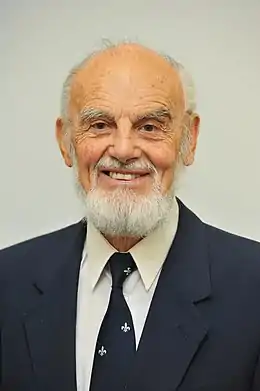Peter Beighton
Peter H. Beighton, né le à Blackpool dans le Lancashire (Angleterre)[1], est un médecin interniste et médecin généticien sud-africain d’origine britannique ayant eu une carrière universitaire à l’université du Cap. Il est connu pour ses travaux sur le syndrome d'Ehlers-Danlos[2] et son intérêt pour l’histoire de la génétique médicale qu’il partage avec son épouse Greta.

| Naissance | |
|---|---|
| Nationalité | |
| Formation |
Arnold School (en) |
| Activités |
| A travaillé pour | |
|---|---|
| Distinction |
Biographie
Il obtient sa qualification de médecin en 1957 au St Mary's Hospital de Londres et peu après devient membre du collège royal de médecine de Londres (MRCP-UK) et de celui et d’Édimbourg[1] ; ses recherches dans le domaine des maladies du tissu conjonctif sont couronnées par un doctorat de l’université de Londres.
Après avoir accompli divers stages d’interne, il est médecin-officer dans un régiment de parachutistes au sein des forces des Nations Unies pendant la crise du Congo. En 1966 Beighton commence sa formation en médecine interne au St Thomas' Hospital, à Londres et en 1968 et 1969 obtient une bourse de recherche Fulbright (Fulbright research fellowship) pour aller travailler en génétique médicale aux États-Unis, au Johns Hopkins Hospital de Baltimore sous la direction de Victor McKusick.
En 1968, il est l’auteur d’un article paru dans le British Heart Journal dans lequel il attire l’attention sur le fait que les voyages aériens créent des conditions propices à la survenue de thromboses veineuses profondes. Cependant, les compagnies aériennes négligent d’en informer leurs passagers et ce n'est qu’au début des années 1990 qu’un lien entre les vols long courrier et la thrombose veineuse est rendu public.
Il a été professeur de génétique humaine entre 1972 et 1999 au sein de la Faculté des sciences de la santé de l'Université du Cap[3]. Son travail se concentrait sur la génétique médicale et le développement de techniques cytogénétiques, biochimiques et moléculaires.
Texte anglais à traduire :
Beighton undertook clinical research in the Sahara Desert and epidemiologic studies on Easter Island, Tristan da Cunha and in Southern Africa. In 1972, Beighton was appointed Professor of Human Genetics at the University of Cape Town's Faculty of Medicine. His research was largely on inherited disorders of the skeleton and connective tissues.
Beighton has received several awards including the gold medal of the British Orthopaedic Association, the President's Medallion of the South African Orthopaedic Association, the Smith & Nephew literary award and the silver medal of the South African Medical Research Council. In 2002, he received the Order of Mapungubwe - Bronze, for outstanding work and lifetime achievement as a scientist, and research into the inherited disorders of the skeleton[4].
Beighton has been accorded Fellowships of the University of Cape Town and the British Society of Rheumatology, and in 1999, he obtained the degree of Master of Philosophy in History by thesis at the University of Lancaster, UK. Professor Beighton retired with Emeritus status at the end of 1999, retaining his links with UCT, and collaborating with the University of the Western Cape Faculty of Dentistry. In 2011 he was still employed part-time in the UCT Faculty of Health Sciences as a Senior Scholar.
Fourteen of Professor Beighton's postgraduate students have been awarded Doctorates, and eight of these have achieved Professorial or Associate Professorial status. Professor Beighton is the author, co-author or editor of 20 monographs and editions, 34 chapters and more than 400 medical publications.
Peter Beighton et son épouse Greta Beighton partagent le même intérêt pour l’histoire de la génétique médicale et ils ont publié ensemble deux ouvrages de courtes biographies de personnalités éponymes de maladies génétiques. Peter and Greta ont aussi été plusieurs fois champions d’Afrique du Sud de course d’orientation.
Éponymie
- Beighton a donné son nom aux 5 critères d’hypermobilité articulaire permettant d’établir le diagnostic de syndrome d’Ehlers-Danslos de type 3[2],
Œuvres
- (en) The Man Behind the Syndrome. By Peter Beighton & Greta Beighton. Springer Verlag (1986) (ISBN 0-387-16218-6)
- (en) The Person Behind the Syndrome. By Peter Beighton & Greta Beighton. Springer-Verlag; (June 1997) (ISBN 3-540-76044-X)
Notes et références
- (en) « University of Cape Town. professor of human genetics », S.A. Medical Journal, , p. 1700 (lire en ligne [PDF])
- (en) Beighton P, De Paepe A, Steinmann B, Tsipouras P, Wenstrup RJ, « Ehlers-Danlos syndromes: revised nosology, Villefranche, 1997. Ehlers-Danlos National Foundation (USA) and Ehlers-Danlos Support Group (UK) », Am J Med Genet, vol. 77, no 1, , p. 31–7 (PMID 9557891, DOI 10.1002/(SICI)1096-8628(19980428)77:1<31::AID-AJMG8>3.0.CO;2-O)
- Peter Beighton, Karen Fieggen, Ambroise Wonkam et Raj Ramesar, « UCT's contribution to medical genetics in Africa - from the past into the future », South African Medical Journal = Suid-Afrikaanse Tydskrif Vir Geneeskunde, vol. 102, no 6, , p. 446–448 (ISSN 0256-9574, PMID 22668932, DOI 10.7196/samj.5621, lire en ligne, consulté le )
- http://www.thepresidency.gov.za/pebble.asp?relid=1674 « Copie archivée » (version du 1 avril 2012 sur Internet Archive)
Liens externes
- (en) Notice biographique sur Peter Beighton illustré d’une photographie sur le site de l’Université du Cap